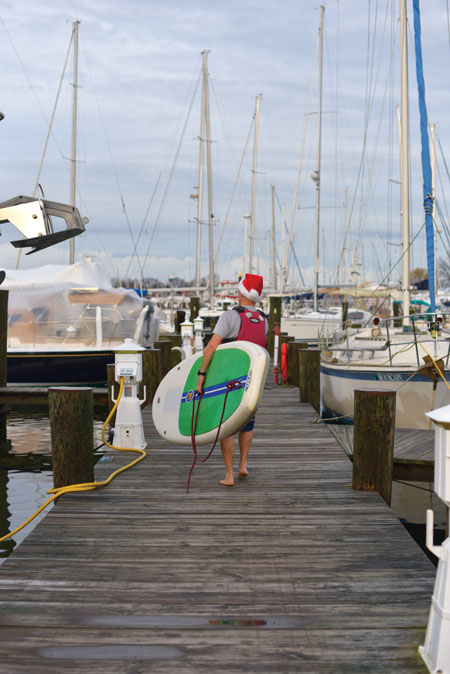Tips for Living Aboard in the Winter
"Deck the halls with reams of shrink wrap..."
The song goes something like this for the determined sailors who winter aboard in Annapolis. December marks the transition from the loveliness of fall to the full embrace winter as friend and foe.

Some challenges winter brings: Jack Frost causes dockside water to cease until spring. Fierce northwest winds blow water out of Western Shore creeks making the water level seem more variable than in warmer weather, and the chasm from dock to boat sometimes turns sailors into temporary cliff dwellers. Add to that the near freezing temperatures of the water under the docks that remind one every day of the perils of hypothermia and the fragile gift of life. The top priority of walking docks and being on boats in the winter is to never, ever, ever fall in the water.
So winter liveaboards must be a wreck of fear and depression with challenges like this, right? Think again. Most liveaboards approach the very real risk of calamity in the cold water with a sober acceptance of the risk, a positive attitude, and as many preventative measures as they can muster. That collective knowledge results in some tips for negotiating the docks when winter throws her worst at us.
Lifejackets are not just for boats.
Often young children wear their lifejackets up and down the docks on warm summer days so that they’ll stay afloat should they fall. That same wisdom applies for all ages in the winter. Wearing a lifejacket up and down the dock might be just enough to save someone who falls in frigid water and can float or swim to a ladder to safety.
And rock salt is not just for driveways.
A sprinkling of rock salt on the docks, finger piers, and even the decks of a boat can melt away frost and keep surfaces less slippery.
Wear non-skid on your feet.
Yaktrax makes slip-on cleats that help maintain traction in ice and snow. The slip-ons made with coils are less likely to damage boat decks.
Keep a whistle in your pocket.
A whistle or even a signal horn can alert others in the marina to trouble when it strikes. Keeping a whistle attached to a lifejacket makes this safety measure easy to implement.
Know the location of dock ladders.
Most docks have one or two ladders on them so that people who fall in can get out easily. Know where these ladders are. It may also help to notice which boats on the docks have stern ladders that could serve as another exit from the water. Many docks also have a life ring—knowing where it is may help you to throw a life ring to someone else who has fallen in.
Some liveaboards put out extra swim ladders and flotation devises near their boats should they fall in while getting on. This gives them a close and quick exit point to get back out of the water.
Use extra hand-holds.
When possible, many liveaboards install extra hand-holds along the dock to give themselves something extra to grab should they need it. These range from dock lines laced between pilings at waist height to ladders secured on their sides. Sturdy handles screwed into finger piers and steps or ramps with built-in hand rails also provide more security.
The friendlier side of the season.
Once risks are mitigated as much as possible, liveaboards welcome the friendlier side of the season. Translucent igloos appear in the form of shrink-wrapped cockpits up and down the docks. These look especially cheery on a cold December night when colorful holiday lights glow from under the wrap. Lights aren’t confined to cockpits as liveaboards decorate their boat for the season. Designs ranging from small trees made from tomato cages turned upside down to large displays fit for the Eastport YC Lights Parade ring in the cold season. And every now and then, as a special treat when the weather is particularly nice, Santa may climb on his SUP for a stolen December paddle.
By Tracy Leonard
For more articles about cruising, click here!
Of the many fantastic traits of folks who live aboard during an Annapolis winter, one stands out: most liveaboards freely share advice with each other and especially with newcomers to winter in the marina. If you have any tips that aren’t here, please share them with us at [email protected].




